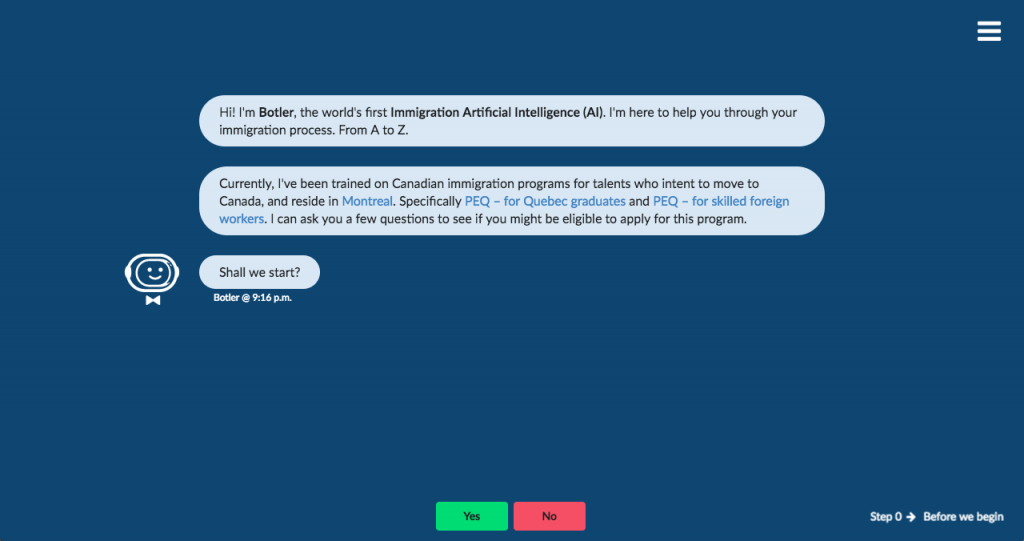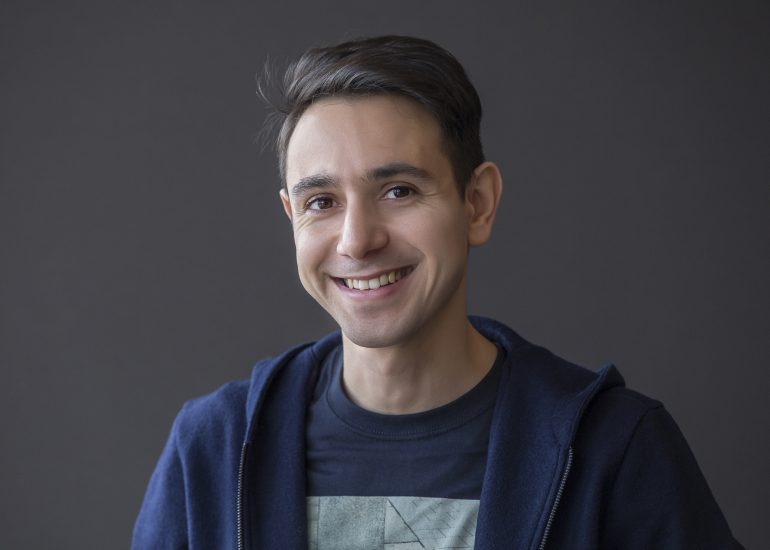When the Trump Administration passed an executive order barring entry from seven Muslim-majority countries, it made immigration — and even re-entry to the US by permanent residents with passports from these countries — virtually impossible.
Canadians, including the Canadian tech community, have rallied to make a statement that everyone is welcome. Many founders have expressed a willingness to open their doors to people displaced.
While the ban has been halted for now, the emotional effects are fresh for many people. Stories have been popping up of founders launching initiatives to get people to Canada as they face uncertainty in the US.
One of these stories from Canada’s tech community include a Montreal-based startup called Botler, which wants to make it easier to start the immigration process for Quebec.
While Amir Moravej and his team had planned to launch Botler, their AI-assisted immigration bot, in April 2017, the executive order has significantly sped things up.
An Iranian immigrant to Canada, Moravej anticipates that many of the international students from the countries on Trump’s banned list will have to change their plans.
“A lot of students come to study in Quebec and after they graduate they get admission to universities in the US,” Moravej told BetaKit. “They want to go to the US to pursue their PhDs or Masters. Now, some of them can’t. They have to stay here, so we want to help them to stay here, get their permanent residencies in Canada, and forget about the US. At least for now.”
“Our initial plan was to do a soft launch in April. Given the immigration ban in the US, we decided that we needed to launch.” – Amir Moravej
After specializing in deep learning during his Master’s in Engineering at Concordia University in Montreal, Moravej decided to stay in Canada. He started the process of applying for permanent residency through the Startup Visa Program, but didn’t know that the Startup Visa Program isn’t valid in Quebec — only the other Canadian provinces. Having lost months on his work permit, he applied through the program designed for Quebec students. Unfortunately, the process is lengthy and he lost his status. Moravej had to leave Canada.
Back in Iran, he decided to learn more about Quebec immigration; he wanted to know what the immigration process was like for other applicants. After learning all of the rules and regulations from the government websites, he turned to forums and community groups to find personal information, but was overwhelmed by the volume of posts and information available.
“There are a lot of posts in the forums, and it’s humanly impossible to read every single one of them,” said Moravej. “I’m an engineer, so I created a program to read through these posts and check if [they] are relevant to my case or not, and just show me the cases that are relevant. I was using machine learning and this program was running 24/7. The program was getting smarter, so I decided to share it with other immigrants.”
This was the foundation of Botler, an AI-assisted immigration bot that streamlines the immigration process in Quebec. It helps Quebec immigrants get the information they need and start the application process without the initial aid of a lawyer.

His first prototype, a product Moravej launched in June 2016, called Lounge, won the FounderFuel prize at Startupfest. It was a community for immigrants containing a bot that could help people get the right information for their particular cases. He partnered with a law firm, CanadaVisa.com, and after winning the FounderFuel prize started reconsidering the direction of his product. He and his team decided to tackle the process on a more fundamental level, and help immigrants go through the whole immigration process using AI.
Botler functions like an immigration lawyer, helping hopeful immigrants to find out first if they’re eligible for permanent residency, and then helping them through the application process.
“We automate the full process,” said Moravej. “We wrote a bot that can ask you questions to find out if you’re eligible or not. If you’re not eligible, the bot will tell you why, and what you can do to become eligible.
Their product augments the work of lawyers by automating a number of the tasks that can take a great deal of time.
“If you are eligible, the bot will give you a checklist that’s personalized for your case. You can prepare your documents, upload [them], the bot will review the documents for you, and if everything is good, the bot will automatically fill out the application forms for you. It will give you an application package which you can submit to the government, or you can hire a human lawyer to communicate with the government on your behalf. “
While it may sound like Botler cuts lawyers, they are actually working with a legal team and testing their product with law firms. Their product augments the work of lawyers by automating a number of the tasks that can take a great deal of time. Rather than focusing on a small number of cases, immigration lawyers can now help more people through the process simultaneously.
Botler is soft launching their product today, and will be presenting their product to a group of bot enthusiasts at the MTL Bot Meetup at Notman House in Montreal. While their product cannot yet complete the final step of the application process, Moravej felt that it was the right time to launch.
The application is web-based, and at any time during the process, the applicant can be connected with a lawyer. Moravej and his team have not yet decided on a revenue model, but will likely use a paid subscription model.
“The full immigration process is a multi-step process,” he said. “We haven’t tested the final step yet. Our initial plan was to do a soft launch in April, but given the immigration ban in the US, we decided that we needed to launch. So now we can at least help people to get the process started and take steps toward permanent residency in Canada.”


